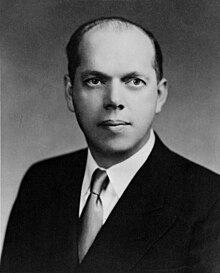Philip Abelson | |
|---|---|
 Philip Abelson | |
| Born | April 27, 1913 Tacoma, Washington, United States |
| Died | August 1, 2004 (aged 91) Bethesda, Maryland, United States |
| Nationality | American |
| Alma mater | Washington State University University of California, Berkeley |
| Known for | Discovery of neptunium, isotope separation techniques |
| Awards | Kalinga Prize (1972) National Medal of Science (1987) Public Welfare Medal (1992) Vannevar Bush Award (1996) |
| Scientific career | |
| Fields | Nuclear physics |
Philip Hauge Abelson (April 27, 1913 – August 1, 2004) was an American physicist, scientific editor and science writer. Trained as a nuclear physicist, he co-discovered the element neptunium, worked on isotope separation in the Manhattan Project, and wrote the first study of nuclear marine propulsion for submarines. He later worked on a broad range of scientific topics and related public policy, including organic geochemistry, paleobiology and energy policy.
Abelson served as editor-in-chief of the journal Science from 1962–84, president of the Carnegie Institution of Washington from 1971–78, and president of the American Geophysical Union from 1972-74. His frequent editorials in Science, both during and after his term as editor, became known for their strident and thought-provoking views. A collection of 100 of his editorials was published as a book, entitled Enough of Pessimism. He may have been the original source of the phrase 'extraordinary claims require extraordinary evidence'.